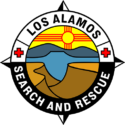How to Participate in SAR
There are a few different ways to participate in SAR.
Visit our state teams map to see what teams are near you. If you already have in mind a particular Los Alamos team you wish to join, check the local team links page to make contact.
- “Ground Pounder” (GP): The stereotypical “Ground Pounder” role is the backbone of a SAR team. We need competent, healthy outdoors people who know how to enter a set of coordinates into their phone and navigate to that location; who are capable of talking over a handheld radio clearly and efficiently; and whose hiking experience and self-sufficiency allows them to bushwhack through the woods in the dark and cold without becoming a liability themselves (we aim to rescue subjects, not add another one to the field). If you have some medical training, that’s a bonus but it’s not necessary. Most GP’s do not have any medical training.
- Specialized team member: We also value our specialized teams: Dog teams, including air-scent, trailing, and human-remains; Drone pilots, especially those with thermal infrared cameras; Trackers, to find and follow footprints; and UTV, biking, and 4WD vehicle teams. Do you have a snowmobile? We need you! Like GP’s, these members need to have expertise and self-sufficiency in their area of specialization. Navigation ability is paramount, as is the ability to problem-solve and fully control the resource they’re providing.
- Incident Base volunteers: There are other ways to participate in SAR without frolicking in the woods at all. We need organized, reliable people to help at Incident Base. These volunteers must be willing to operate a radio or enter coordinates into mapping software on a computer, and otherwise support Incident Command as needed. These staffing roles don’t require any hiking and are largely stationary. Granted, you still need to be navigation-savvy, self-sufficient, and well prepared. You might not be wandering in the forest, but you may be sitting at a folding table in a remote meadow in freezing conditions at 3AM after driving several hours to the middle of nowhere. If that sounds like fun, you’ve come to the right place.
- Incident Base Command: We need committed, experienced SAR volunteers for the higher-level roles such as Incident Commanders, Field Coordinators, and Communication operators. If you have participated in SAR in other states, have comparable military background, or other experience that might qualify you for these management-type roles, please contact us.
THE IDEAL SAR MEMBER: Without disregarding the above roles, the most important aspects of a SAR volunteer are not the specialized skills. The defining characteristic of the most valuable SAR participants is the recurring willingness to just say “yes.” “Yes,” when you receive a text message in the middle of the night for a mission that requires a two-hour drive each way. “Yes,” even though you’re exhausted (and everyone is exhausted at 2AM). “Yes,” when you are supposed to be at a meeting at work the next morning. “Yes,” even though you haven’t been spending enough time with your family. “Yes,” even though there is an excellent chance that you will spend time and energy preparing your gear and driving towards Incident Base, only to be told the mission is off, and you have to turn around and head back home.
There are always plenty of reasons to say “no”. “No” is easy. “No” is the default. No one else but you and the team leader will ever know if you don’t respond to a call-out. It takes a surprising amount of internal fortitude, willpower, and self-control to be a “yes” person at 2 AM. Going on a search is rarely an attractive prospect. Responders don’t do it because it’s fun. Rewarding? Sometimes. Fun? Not usually. There is a sense of camaraderie and shared purpose, for sure, but that is not what makes you say “yes.” You say “yes” because you’re committed and you know the value of what we do.
There are hundreds of individuals collectively listed on the rosters of the SAR teams in District 1 (D1). Yet, out of those hundreds of possible responders, on any given search in D1 there are usually between 8 and 16 people who say “Yes” and show up at Incident Base. SAR does not need simply another name to add to our lists. We need committed volunteers.
Most often, we see the same familiar faces. The same person who came out at 10 PM only two nights ago is back again at 2 AM for some more rescuing. It’s an easy way to earn a hardcore reputation and become a leader. Just show up. But, that is the hardest part.
Getting trained is not really the obstacle. We can quickly teach you how to work a radio or enter coordinates onto the computer if you have a desire to help at Incident Base. If you’re already a competent hiker, climber, biker, or hunter, we can easily teach you the last few things you need in order to go out into the field.
What it comes down to is that having all the SAR skills and abilities in the world will not save someone if you aren’t willing to say “yes” when they need you.
The defining trait of the true heroes of New Mexico SAR is the willingness to regularly say “Yes” even when it’s cold and dark and hard.
